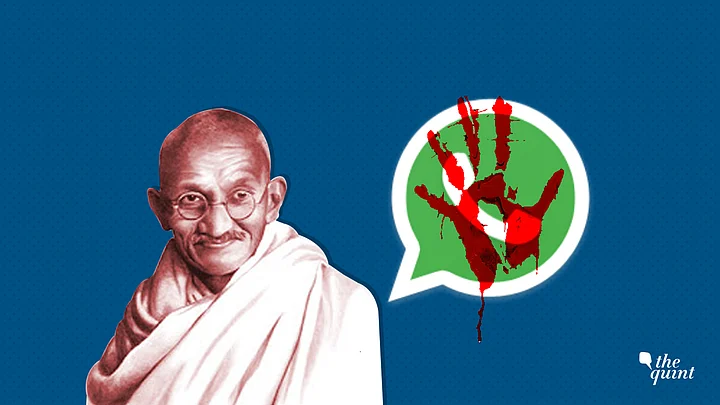That social media in general — and WhatsApp in particular — are important channels through which bigotry is spreading, is now well-known, if less well-understood.
Around ten years ago, I had begun to speculate that as mobile internet pervades societies and they become radically networked, we will see both entirely new forms of politics, and new forms of political expression.
Too Little Govt Censure
Let’s take the specific case of mob lynchings that have begun to attract international attention. It is now increasingly clear that rumours, misinformation and disinformation are spread over social media by organised political groups, unorganised but ideologically aligned individuals, casual bigots and even non-malicious but unthinking individuals.
Where messages do not incite specific, immediate violence, they raise the temperature of an already fevered body politic. Even small, unrelated triggers can result in mob violence.
In what must be entirely coincidental, the union government decided to send a grave letter to WhatsApp, expressing deep disapproval and urging immediate action against misinformation on its network. For its part, WhatsApp has announced a competition to identify ways in which it can do so. These are promising developments but it’s important to realise that they are tackling one aspect of a much bigger problem.
Was the union government right in demanding that WhatsApp take action? If the government considers lynching a serious problem, then its top leaders ought to take to the pulpit and speak out against the trend.
Chief ministers and political leaders ought to do it too. But we’ve seen too little of this.
Censoring Telecom & Internet Won’t Help
It’s not too late though. Now that the union government does believe there is a problem, the Home Ministry ought to use its considerable powers to tackle the problem. It’s not hard either. One well-advertised arrest, prosecution and sentencing will deter the cowards that comprise lynch mobs. Three high profile arrests and prosecutions – and see how quickly lynchings stop. The smallest police station in the remotest village can stop lynchings if the local sub-inspector has received clear political messages against it.
Yes, to the extent that WhatsApp provides a mass public service, it cannot escape responsibility for the consequences of its technology. It is best that it recognises the burden of this responsibility on its own, pushed by market and social forces.
Its recent decision to explore ways to manage rumour-mongering and incitements to violence suggests that it has begun to do so. Over and above this, in extraordinary circumstances, where there is clear and present danger of violence, the government can temporarily block the service. (The emphasis is on extraordinary, clear and present danger, violence and temporarily.)
We should be careful though of passing the buck entirely to WhatsApp. Even if messages on its network were not encrypted, holding a communications service provider liable to what flows through its pipes doesn’t make sense beyond a point. WhatsApp runs on smartphones that use mobile networks that run on telecom networks.
Will the government also write strong letters to Apple, Google, Xiaomi, OnePlus, Micromax, AirTel, Reliance Jio and BSNL for allowing their users to share messages that result in mob lynching?
What if people call each other over the fixed line telephones and incite hatred? Will telecom companies be liable for the conversations people have over the telephone?
Beyond a point it becomes absurd to argue that service providers must be held accountable.
Taking a Cue from Gandhi
Besides, let’s not forget that 780 million people in India watch television. Unless someone can persuade us that our television channels are delivering programmes that make for a mature, peaceful and civilised society, we have to acknowledge that they contribute to the problem of mass lynchings too.
At the very least, they too are responsible for raising temperatures. Can we be certain that some of them won’t begin to incite violence if social order reaches breaking point? The history of the past century shows that radio stations have worsened mass atrocities elsewhere in the world.
To be absolutely clear: this is not a demand for government censorship of television channels. It is not even a call for greater regulation.
Rather, it is a call for much greater sagacity in the political leadership, who, with their words and deeds, can calm things down, and through public disapproval, discourage those who engage in violence.
How can it be done? Gandhi called off the Non-Cooperation movement in 1922 after a violent mob burned down a police station, killing 22 people.
He famously said, “Crimes will certainly take place in this world. We are no doubt responsible for them but they are an indirect responsibility. However, there are certain crimes for which we are directly responsible. We have but to atone for those.”
Gandhi was severely criticised for this, as calling off the movement was a major setback to the freedom struggle. He stood against his own party leaders, rank and file. As he later wrote, “to this date I have felt that I have served the country by calling off the non-cooperation movement. I am confident that history will look upon it as a form of perfect satyagraha and not as an act of cowardice.”
That’s how it’s done.
(Nitin Pai is co-founder and director of the Takshashila Institution, an independent centre for research and education in public policy. He tweets @acorn. This is an opinion piece, and the views expressed above are the author’s own. The Quint neither endorses nor is responsible for the same.)
